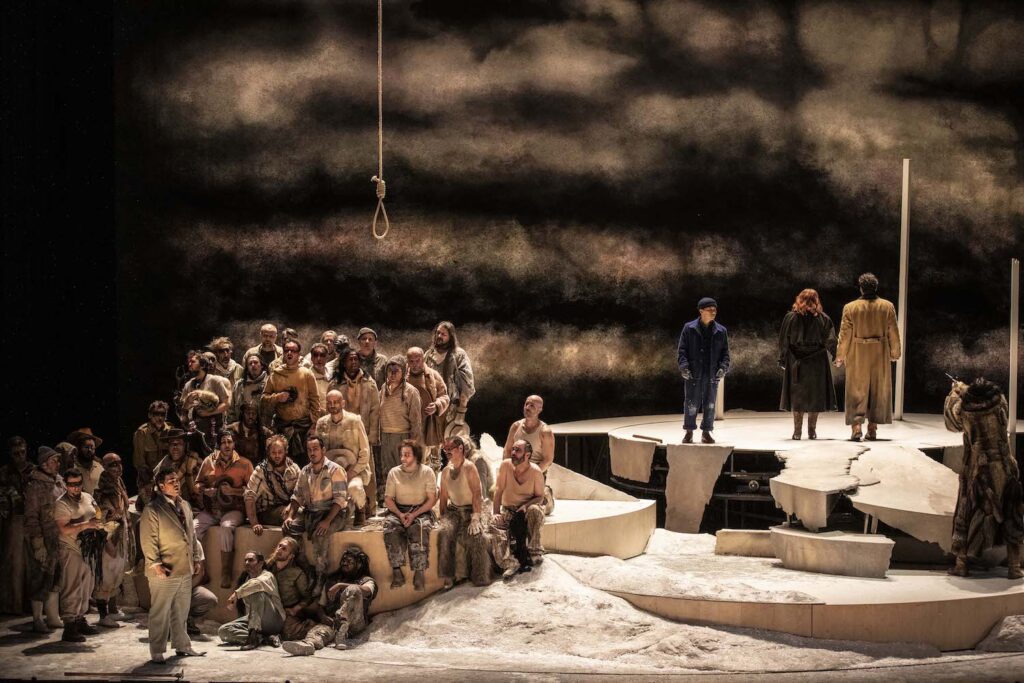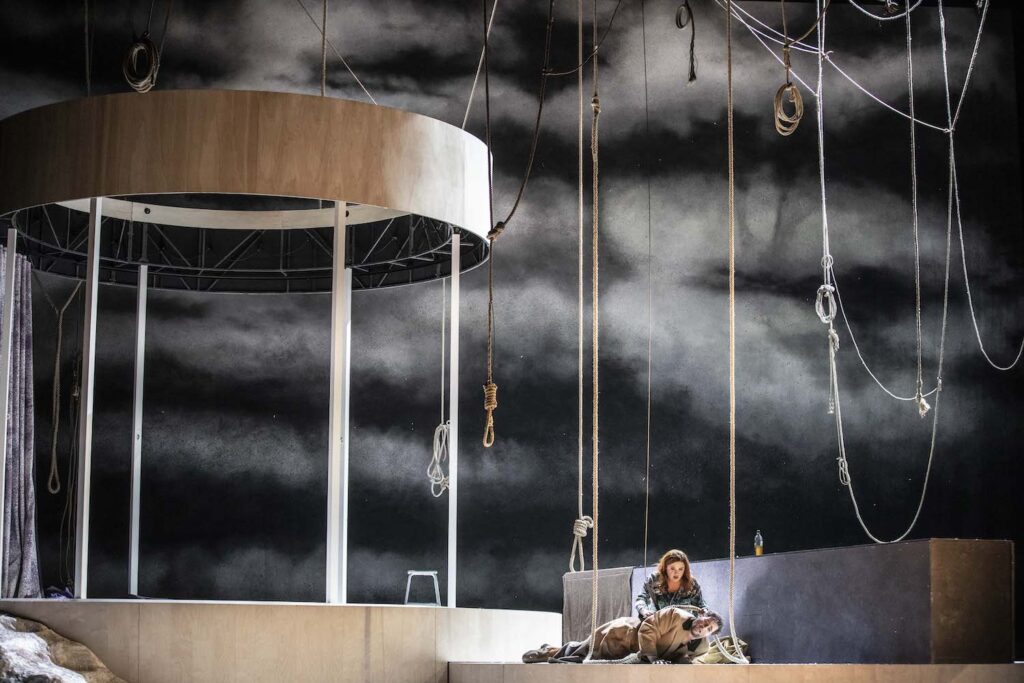Forget the West of San Francisco born David Belasco’s The Girl of the Golden West (the source of Puccini’s opera), not to be confused with Peter Sellers’ The Girls of the Golden West. Think Westphalia maybe, or more philosophically, West Berlin.
The first offering of the Opera de Lyon’s prestigious Winter Festival. This year the festival is entitled “Rebattre les Cartes” — the heroines of the Festival’s three operas all reshuffle the cards, here it is Minnie who bets the life of her lover in a poker game.
German stage director Tatjana Gürbaca is a disciple of legendary stage director Ruth Berghaus and a Wagner specialist to boot. Thus Puccini’s 49ers became her Nibelungen, her sheriff Jack Rance took on an uncanny resemblance to Walkűre’s Hunding (see lead photo). Minnie and her rather simple boyfriend Mike Johnson escaped a California Valhalla that we might have relished watching it go up in flames, save for the lusty miners whom we came to know and love as refugees straight from Bertold Brecht’s Mahagony.
Suffice to say that the artistically mature Puccini of 1911 was a man of the European world, well aware of theatrical currents emanating from beyond the Alps, rather more than he was the raconteur of stories from the Sierras of American Old West. The Grübaca Europeanization of this American story fit far more comfortably within Puccini’s newly sophisticated, mid-career operatic endeavor than would a staging that attempted to evoke quaint American atmospheres.
La fanciulla del West was not a success at its world premiere at the Metropolitan Opera because it was neither vintage Puccini nor was it American.
In Lyon just now the conductor was Daniele Rustioni who stepped onto the podium and immediately established his intention to tell an urgent story, not to linger on the emotive moments of its protagonists, or only very briefly. The pit was Straussian — quadruple woodwinds, two harps, expanded percussion joined the strings to create a maelstrom of sounds that melded Italian lyricism with constant, pithy stage action.
The maestro drove it unfalteringly to its shattering ending. Minnie and Dick had destroyed sheriff Jack and may have escaped California, but the miners were left trapped in their lust for gold and their nostalgia for everything they had left behind.

The set was a few Tristan-worthy geometrical shapes, bathed in a sort of dusty gold light, sheriff Jack Rance was enveloped in huge animal hide coat, the chaotic law and lust of a mythic California world. Saloon tycoon Minnie appeared in a shining gold robe, then removed her too tight, golden slippers, a clean cut Dick Johnson strode in, though his alter-persona, whom we never met, was the terrifying Mexican bandit Ramirez.
Dick and Minnie (Minnie, pointedly, now in comfortable shoes and pajamas) consummated their love during the second act snowstorm. A few snowflakes did actually fall from time to time within the brightly lighted geometry, in tribute to David Belasco’s naturalism, though the act’s primary image were the many nooses that descended across the stage, a couple of ropes used to hoist Mike (Minnie snapped the security buckle) into the fly space that served as the Belasco attic.

From the beginning the miners, the Wells Fargo agent Ashby, Sonora, Sid, Happy, Bello etc., melded together as acolytes to the golden priestess Minnie, save the two native Americans (called Indians), Billy and Wowkle who knew only that life leads to death. In the end the miners were shown abjectly huddled together, Billy had been destroyed by the disheveled and distraught sheriff Jack Rance, who put a revolver to his own head in the final black out.
Epic theater indeed.
Minnie was sung by Italian soprano Chiara Isotton who belted out the high notes with the ease of a fine Elektra. Signorina Isotton does have a great Italian warmth in her midrange voice that served her well in Puccini’s frustratingly few moments of emotive expansion. She does not have the ease and confidence of diva movement (though clearly she is an arrived diva), an attribute that could possibly contribute to a cowgirl Minnie, but here did not find a sufficient Wagnerian philosophical dignity.
Dick Johnson was sung by Italian tenor Riccardo Massi who in addition to possessing a fine voice and ample technique, evidences excellent musicianship. With all the Italianate tenor resources in place he still found the qualities to convey the vocal innocence of a jugendlicher heldentenor, complementary to the epic theater intentions of the director.
Hunding aka Jack Rance was sung by Italian baritone Claudio Sgura. Sig. Sgura is of imposing figure, and of black voice, attributes that served him well to create a Wild West sheriff who was possessed of the honestly raw appetites of love and justice that prevail in the wilds of humanity. Mr. Sgura enacts Scarpia and Iago, as well as Jack Rance on the world’s major stages. There are no Wagnerian credits.
The world of the gold-possessed forty-niners were a lively bunch of polished performers that included the beautifully voiced male contingent of the Opera National de Lyon chorus.
Michael Milenski
Opéra Nouvel, Lyon, France. March 15, 2024